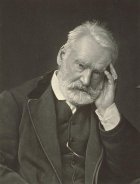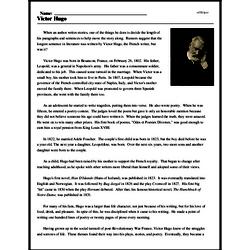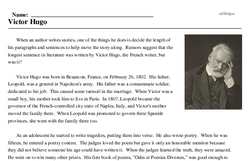Victor Hugo
Victor Hugo
Reading Comprehension for February 26
When an author writes stories, one of the things he does is decide the length of his paragraphs and sentences to help move the story along. Rumors suggest that the longest sentence in literature was written by Victor Hugo, the French writer, but was it?
Victor Hugo was born in Besancon, France, on February 26, 1802. His father, Leopold, was a general in Napoleon's army. His father was a consummate soldier, dedicated to his job. This caused some turmoil in the marriage. When Victor was a small boy, his mother took him to live in Paris. In 1807, Leopold became the governor of the French-controlled city state of Naples, Italy, and Victor's mother moved the family there. When Leopold was promoted to govern three Spanish provinces, she went with the family there too.
As an adolescent he started to write tragedies, putting them into verse. He also wrote poetry. When he was fifteen, he entered a poetry contest. The judges loved the poem but gave it only an honorable mention because they did not believe someone his age could have written it. When the judges learned the truth, they were amazed. He went on to win many other prizes. His first book of poems, "Odes et Poesies Diverses," was good enough to earn him a royal pension from King Louis XVIII.
In 1822, he married Adele Foucher. The couple's first child was born in 1823, but the boy died before he was a year old. The next year a daughter, Leopoldine, was born. Over the next six years, two more sons and another daughter were born to the couple.
As a child, Hugo had been raised by his mother to support the French royalty. That began to change after reaching adulthood, as he spoke with other writers more liberal than himself and adopted some of their views.




